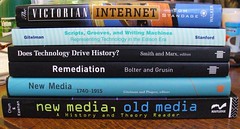 Image by Krista76 via Flickr
Image by Krista76 via Flickr
The chorus appears to be getting louder and louder on content marketing in bloggersphere, digital media, and traditional media. Like any new concept over the years in business, figuring out what comes first is no easy task. In this case, should CMO’s be looking at content marketing or content strategy as the first order of business on the agenda? Where you start the discussion can determine very much where you end up.
Standardization in language, meaning, and terminology are essential to a fledgling and yet expanding concept. Presently, there appears to be multiple meanings and uses for each of the terms content strategy and content marketing. For the purposes of this article, I am going to be literal with the use of the term content strategy as just that – strategic. And view content marketing in what I believe to be more of a tactical perspective.
To inform a content strategy, it strikes me that there are five key areas to evaluate:
- Buyer understanding: gaining an understanding of how buyers intend to consume, utilize, and act upon content are the bedrock of a content strategy. The deeper the understanding, the more targeted and relevant content can be for buyers. Buyer persona development is a methodology for informing strategy. CMO’s today should have on the table a robust understanding of their buyer personas and relevant segments before committing what are not so cheap dollars to content marketing tactics.
- Buyer research insight: buyer persona development, done via sound qualitative means, can reveal illuminating insight into what buyers are actually researching for in the buying process. Getting “outside-in” insights can be the one area that separates what gets read and what doesn’t. Knowing what buyers are researching for determines what should be produced.
- Buyer media: it is easy to make broad assumptions that your buyers are everywhere and using every available means of media. Buyer persona development can provide powerful stories on which media is being used by buyers most prevalently and what are the differences between segments. Informed with this knowledge, CMO can develop content strategies that apply to specific market segments versus one size fits all.
- Buyer journey: getting a picture of the journeys buyers are taking to make purchases, solve problems, and further initiatives can help inform what type of content is relevant for each step of the buying journey. Different content types, forms, and media can make a difference depending on the stage of the buying journey. Buyer persona development along with buyer journey mapping can give CMO’s the ability to know which types of content levers need to be pushed at each stage of the buying journey.
- Buyer goals: a cornerstone of buyer persona development is getting at the core of buyer goals and how they impact the decisions they make. Informed with this understanding, CMO’s today can guide content strategy to ensure that it furthers the goals of their buyers. A rich and deep understanding of buyer goals helps to serve as a measuring stick on an overall content strategy and the content actually created. A CMO can continuously end a content strategy discussion with this simple question: Does what we talked about today further the goals of our buyers?
As the need grows for CMO’s to develop content strategy in the digital age, the increasing role of buyer persona development to inform will likewise grow. The noise, clutter, and dust spewed up by the fast moving content marketing bandwagon everyone is jumping on can cloud a CMO’s vision. Informing a content strategy with buyer persona development can help CMO’s to have a clearer vision on creating a content strategy that make content marketing tactics that much more effective.



